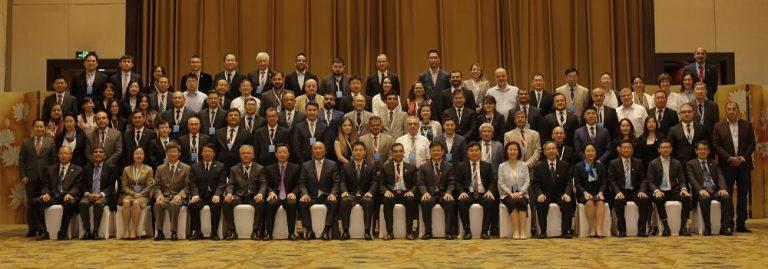Published on 9 September 2019
On 27-28 August 2019, the 4th CAREC Think Tanks Development Forum, a flagship event of the CAREC Institute, was held in Xi’an, China. The forum was attended by more than 100 participants from think tanks, universities, governments, and development partners to deliberate upon key policy issues facing the region covered by the Central Asia Regional Economic Cooperation (CAREC).
The European Institute for Asian Studies (EIAS) was represented at the 4th CAREC Think Tanks Development Forum by its CEO, Mr Axel Goethals.
On 16th May 2019, EIAS has signed a trilateral cooperation MOU in Ulaanbaatar, Mongolia with the CAREC Institute (CI) and the International Think Tank for Landlocked Developing Countries (ITTLDC). One of the key objectives of the cooperation is to identify, develop and implement FinTech and digitalisation solutions specifically for the landlocked countries of the CAREC region.
The CAREC Institute is a knowledge institution established to enhance the quality of the CAREC Program, through knowledge generation and capacity building. Its main aim is to accelerate economic growth in the CAREC region and to be at the intellectual forefront of its regional economic cooperation.
The CAREC Program was established in 1997 by the Asian Development Bank (ADB) to encourage economic cooperation among countries in the Central Asian region. It consists of a partnership of 11 countries and development partners working together to promote development through cooperation.
Besides the ADB, the CAREC program is supported by five development partners, namely the European Bank for Reconstruction and Development (EBRD), the International Monetary Fund (IMF), the Islamic Development Bank (IDB), the United Nations Development Program (UNDP) and the World Bank.
The CAREC program partnership includes the following 11 countries: Afghanistan, Azerbaijan, People’s Republic of China, Georgia, Kazakhstan, Kyrgyz Republic, Mongolia, Pakistan, Tajikistan, Turkmenistan and Uzbekistan.
Since its inception CAREC has mobilised more than $34.5 billion of investments that have helped establish multimodal transportation networks; increased energy, trade and security; facilitated free movement of people and freight; and laid the groundwork for economic corridor development.
As the reintegration of the Eurasian continent gathers speed, the CAREC countries are poised to reap substantial benefits. With the rapid economic expansion of Japan, Korea and the People’s Republic of China to the east, the Russian Federation to the north, and India and Pakistan to the south, there is a real and growing demand for improved connections between Europe and Asia. This momentum provides CAREC countries with an unprecedented opportunity to emerge as a centre for trade and commerce, to achieve higher levels of economic growth, and to reduce poverty.
There is a huge potential for the European Union to become a proactive facilitator of practical, results-based regional projects, and policy initiatives critical to sustainable economic growth and shared regional prosperity. Real opportunities lay ahead in strongly enhancing the EU’s connectivity framework towards the region and linking it to other economic corridor development initiatives such as the CAREC Program and China’s Belt and Road Initiative (BRI).
The EU, recognising the strategic role of Central Asia in global efforts to promote Eur-Asian connectivity while stressing that these efforts should bring major benefits to the region, has very recently endorsed its “New EU strategy on Central Asia – New Opportunities for a Stronger Partnership”. The Strategy provides a new policy framework for EU engagement with the countries of Central Asia over the coming years. As this new strategy focuses on promoting resilience, prosperity, and regional cooperation in Central Asia, it will focus on increased cooperation with Central Asian countries to promote sustainable, comprehensive and rules-based connectivity, adapting the EU policy to new opportunities which have emerged in the region.
The EU’s commitment to conclude and implement mutually beneficial Enhanced Partnership and Cooperation Agreements (EPCAs) with the interested countries of the region is to become a cornerstone of the EU’s engagement with Central Asia.

